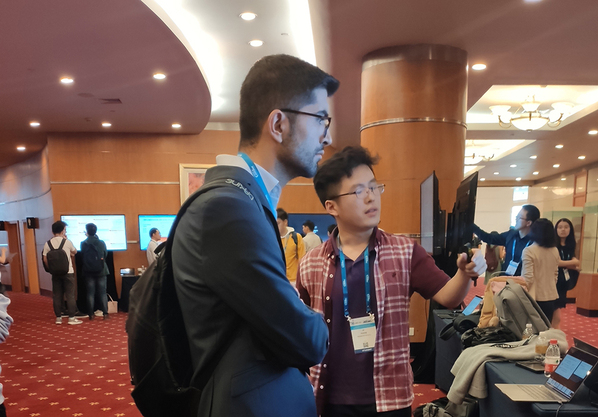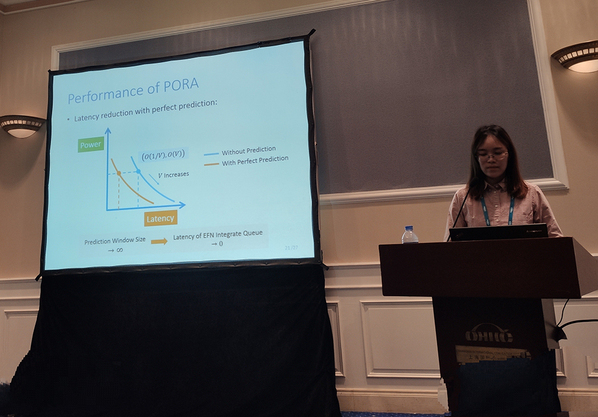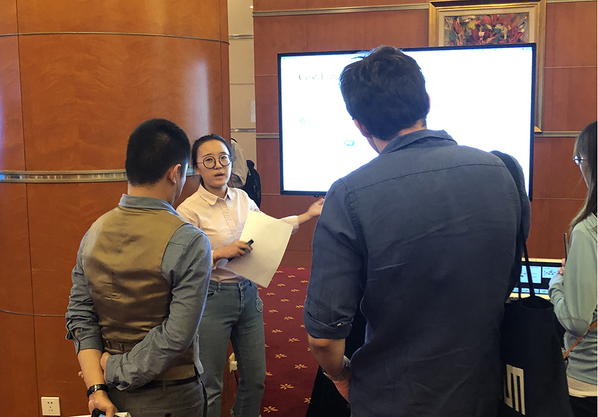Recently, the 53th IEEE International Conference on Communications (IEEE ICC 2019) was held in Shanghai, China, attracting almost 3,000 participants including talented scientists, researchers, and industry practitioners from all over the world. With the theme of “Empowering Intelligent Communications,” this flagship conference aims to provide a platform for sharing and demonstrating cutting-edge technology innovations and research results of IEEE Communications. It also is a symbol of development in the field of next-generation networking and communications. This year’s program covered a variety of promising areas, such as 5G communications, Internet of Things, fog and edge computing, intelligent networking systems, and smart grids.
During the 5-day event, SIST Dr. Shao Ziyu’s research group was invited to present their recent research results. PhD student Huang Xi shared his recent work entitled ‘MIPS: Instance Placement for Stream Processing Systems based on Monte Carlo Tree Search’ in the workshop of selected area in communications on big data (SAC-i3: Big Data). Gao Xin presented her paper entitled ‘PORA: Predictive Offloading and Resource Allocation in Dynamic Fog Computing Systems’ in a technical symposium on ‘SAC-IoT: Internet of Things’. Bian Simeng presented her work entitled ‘Service Chain Composition with Failures in NFV Systems: A Game-Theoretic Perspective’ in a workshop of selected areas in communications on QoS, Reliability and Modeling (CQRM-i1).
‘MIPS: Instance Placement for Stream Processing Systems based on Monte Carlo Tree Search’ explored the placement of processing instances for popular large-scale real-time data stream processing systems. By leveraging Monte Carlo Tree Search methods, the paper first proposed a new two-stage instance placement scheme. The scheme effectively facilitates the deployment for data stream processing applications, achieving efficient resource utilization and ultra-low processing latencies. ‘PORA: Predictive Offloading and Resource Allocation in Dynamic Fog Computing Systems’ investigated the fundamental benefits of predicted future information in promoting the performance of fog computing systems. To this end, the paper opened up a brand-new degree of freedom in the design of fog computing systems by proposing an effective offloading and resource allocation scheme. This scheme proactively exploits predicted future information and available system resources to shorten workload latencies with ultra-low power consumption. ‘Service Chain Composition with Failures in NFV Systems: A Game-Theoretic Perspective’ studied the service chain composition (SCC) with both user dynamics and virtual machine (VM) failures in network function virtualization (NFV) systems from a game-theoretic perspective. By applying Markov approximation techniques, the paper proposed a novel distributed service chain composition scheme. The scheme facilitates dynamic, flexible, and effective network service deployment for large-scale NFV systems, while ensuring ultra-low latency and minimum network congestion.
The above three papers were all completed by students in the research group as first authors, with Dr. Shao Ziyu as the corresponding author, and Dr. Yang Yang as the co-author. ShanghaiTech University is the first responsible institution. Relevant research was supported by start-up funding from ShanghaiTech and National Natural Science Foundation of China.

Huang Xi demonstrating his recent work to one of the participants

Gao Xin presenting her work on a workshop

Bian Simeng answering questions from other participants

